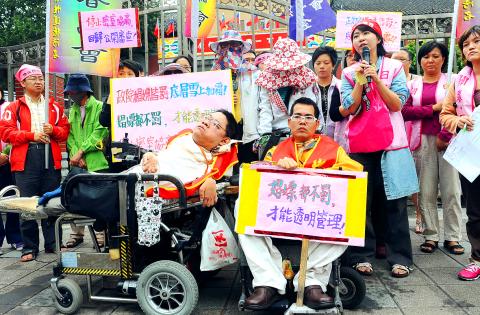The Collective of Sex Workers and Supporters (COSWAS) yesterday rallied outside the Legislative Yuan, calling for the complete decriminalization of the sex industry, before meeting lawmakers from the two main political parties.
The rally comes just a month before a clause in the Social Order Maintenance Act (社會秩序維護法) that penalizes sex workers expires.
Article 80 of the Social Order Maintenance Act, which penalizes sex workers, but not their clients, was declared “unconstitutional” by the Council of Grand Justices on Nov. 6, 2009, and it gave the government and the legislature a two-year period to amend the law.

Photo: Chang Chia-ming, Taipei Times
According to the interpretation, the council declared the clause unconstitutional because it believed that penalizing only sex workers violates of the spirit of equality embodied in the Constitution.
However, while the specific clause expires on Nov. 6, a revised law has yet to pass a legislative review.
Currently, there are three proposed amendments.
One proposed by the Executive Yuan would authorize local governments to create red light districts where prostitution is legal, but it would remain illegal outside such districts.
Another proposed by Democratic Progressive Party (DPP) Legislator Huang Sue-ying (黃淑英) seeks to penalize the client, but not the sex worker, while a third version proposed by Chinese Nationalist Party (KMT) Legislator Cheng Li-wun (鄭麗文) would decriminalize the sex trade for both the worker and the client if passed.
“The Executive Yuan’s version of the amendment only makes the situation worse because it would penalize both the sex worker and the client outside of a designated area, which is to be decided by the local government,” COSWAS executive director Chung Chun-chu (鍾君竺) said at the rally. “So when local governments refuse to create red light districts — which seems to be what would happen — it would be a de facto ban on prostitution.”
After a rally outside the Executive Yuan, COSWAS representatives petitioned lawmakers from both the DPP and the KMT.
“Right now, we don’t consider the Cabinet-proposed draft amendment our only option. We would first have to decide whether sex workers and clients should both be penalized, or if both should be exempt, before deciding whether to create red light districts,” KMT caucus deputy secretary-general Pan Wei-kang (潘維剛) said after the meeting.
On the other hand, DPP caucus whip Tsai Huang-liang (蔡煌瑯) panned the Executive Yuan’s proposal to create red light districts as “irresponsible,” adding that the DPP caucus believed that sex workers should be protected.

Alain Robert, known as the "French Spider-Man," praised Alex Honnold as exceptionally well-prepared after the US climber completed a free solo ascent of Taipei 101 yesterday. Robert said Honnold's ascent of the 508m-tall skyscraper in just more than one-and-a-half hours without using safety ropes or equipment was a remarkable achievement. "This is my life," he said in an interview conducted in French, adding that he liked the feeling of being "on the edge of danger." The 63-year-old Frenchman climbed Taipei 101 using ropes in December 2004, taking about four hours to reach the top. On a one-to-10 scale of difficulty, Robert said Taipei 101

Nipah virus infection is to be officially listed as a category 5 notifiable infectious disease in Taiwan in March, while clinical treatment guidelines are being formulated, the Centers for Disease Control (CDC) said yesterday. With Nipah infections being reported in other countries and considering its relatively high fatality rate, the centers on Jan. 16 announced that it would be listed as a notifiable infectious disease to bolster the nation’s systematic early warning system and increase public awareness, the CDC said. Bangladesh reported four fatal cases last year in separate districts, with three linked to raw date palm sap consumption, CDC Epidemic Intelligence

Taiwanese and US defense groups are collaborating to introduce deployable, semi-autonomous manufacturing systems for drones and components in a boost to the nation’s supply chain resilience. Taiwan’s G-Tech Optroelectronics Corp subsidiary GTOC and the US’ Aerkomm Inc on Friday announced an agreement with fellow US-based Firestorm Lab to adopt the latter’s xCell, a technology featuring 3D printers fitted in 6.1m container units. The systems enable aerial platforms and parts to be produced in high volumes from dispersed nodes capable of rapid redeployment, to minimize the risk of enemy strikes and to meet field requirements, they said. Firestorm chief technology officer Ian Muceus said

MORE FALL: An investigation into one of Xi’s key cronies, part of a broader ‘anti-corruption’ drive, indicates that he might have a deep distrust in the military, an expert said China’s latest military purge underscores systemic risks in its shift from collective leadership to sole rule under Chinese President Xi Jinping (習近平), and could disrupt its chain of command and military capabilities, a national security official said yesterday. If decisionmaking within the Chinese Communist Party has become “irrational” under one-man rule, the Taiwan Strait and the regional situation must be approached with extreme caution, given unforeseen risks, they added. The anonymous official made the remarks as China’s Central Military Commission Vice Chairman Zhang Youxia (張又俠) and Joint Staff Department Chief of Staff Liu Zhenli (劉振立) were reportedly being investigated for suspected “serious